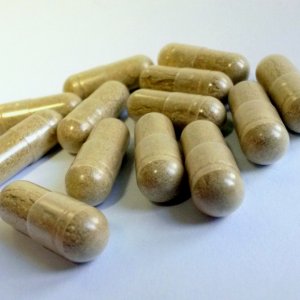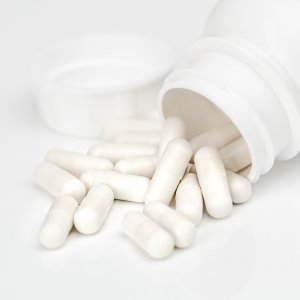Creatine: Can It Make You Better, Stronger, Faster?


Image by GOKALP ISCAN from Pixabay
Creatine has grown in popularity during the last couple of decades as a supplement marketed to athletes as a way to gain lean muscle mass and strength and to help muscles recover more quickly. But is creatine all it is hyped up to be and is it safe to take as a supplement?
What is creatine?
Creatine is an amino acid, which is mostly stored in muscles and the brain. Although the liver, kidneys, and pancreas all make creatine, most people get it from their diets, mainly from eating red meat and seafood.
In the body, creatine is turned into creatine phosphate, which facilitates the production of adenosine triphosphate (ATP). ATP provides the energy that causes the muscles to contract.
Creatine also is used to treat some specific types of brain disorders and may be helpful in treating aging skin. The use of creatine to treat congestive heart failure and heart attacks, Huntington’s disease and neuromuscular disorders such as muscular dystrophia and ALS, is currently being studied.
Because of its muscle-building benefits, creatine may help maintain muscle mass in the elderly as we tend to lose muscle mass as we age.
It also helps regain muscle in patients who have been injured and have experienced muscle atrophy. Researchers concluded that oral creatine facilitates an increase in muscle mass during strength training in a rehabilitative setting. The study, “Oral creatine supplementation facilitates the rehabilitation of disuse atrophy and alters the expression of muscle myogenic factor in humans,” was published in the October 15, 2001, Journal of Physiology.

Photo by Sabel Blanco from Pexels
How does creatine work to improve performance?
Creatine supplements increase the creatine phosphate stored in your muscles. This additional creatine phosphate—also called phosphocreatine—is used to produce more ATP, which provides more energy for high-intensity exercise.
Creatine supplements also aid in increasing muscle mass if that is your goal. It does this in a number of ways, but primarily by allowing you to work harder longer.
Other factors that come into play when using creatine to build muscle include a boost in cell signaling, which facilitates muscle repair and growth; better cell hydration which may help muscle growth; and a reduction in the breakdown of protein which may, in turn, decrease muscle breakdown, among others.

Image by StockSnap from Pixabay
Is creatine proven to work?
The answer is yes, creatine has been proven to increase strength performance.
In two meta-analyses of the scientific literature, creatine was shown to improve both upper and lower limb strength performance for durations of three minutes or less.
Both studies—“Creatine Supplementation and Upper Limb Strength Performance: A Systematic Review and Meta-Analysis” (September 2017) and “Creatine Supplementation and Lower Limb Strength Performance: A Systematic Review and Meta-Analysis” (September 2015)—were published in the journal Sports Medicine.
You may be wondering…three minutes? Why only three minutes?
Well, that is the downside of creatine supplementation. It only really gives you an extra couple of seconds to work with. During high-intensity exercise, ATP is depleted after 8 to 10 seconds but because creatine boosts ATP stores you will have a few additional seconds to be able to continue to work at your optimum level.
That might not seem like enough of a benefit to bother taking creatine supplements but numerous studies have shown an increase in performance and strength for subjects taking creatine. Those few additional seconds can make a difference for those who are involved in sports that are comprised of short bursts of intense activity such as sprinting—both running and biking—and weight lifting. Athletes involved in endurance sports probably will not notice an appreciable improvement in performance.

Image by Steve Buissinne from Pixabay
How should you take creatine?
Creatine is available in tablet, caplet and capsule form, as a powder and drink mix. Creatine monohydrate is the most common version although other formulations of creatine are available. It can be found in grocery stores, drug stores, specialty vitamin stores, and online.
Sometimes, athletes start creatine supplementation with a “loading phase” which leads to a quick gain in the creatine stored in muscles. Typically, the loading phase dosage will be 20 grams of creatine over a five- to seven-day period with the 20 grams divided into four 5-gram dosages per day.
At the conclusion of the loading phase, the recommended dosage is three to five grams of creatine per day. For athletes who don’t choose to start with a loading phase, the three to five grams per day is a normal dosage. If you are taking tablets, caplets or capsules or powder, it is recommended to take the dose with a glass of water since creatine increases the water level in the muscle cells. And, as always, it is important to stay hydrated during the day.

Image by Ben Kerckx from Pixabay
Is creatine safe?
Research shows that creatine is one of the safer supplements even though supplements aren’t regulated by the U.S. Food and Drug Administration.
A clinical review, “Creatine Use in Sports,” published in the January/February issue of the journal Sports Health concluded that short-term creatine use is considered safe with no major adverse side effects. The review authors note that long-term creatine use has been studied only on a limited basis and that its safety for use in children and adolescents has not been researched.
Despite the absence of major side effects, some minor issues have been reported. These include upset stomach, vomiting, diarrhea, nausea, skin rash, headache, fever, dizziness, fatigue, weight gain, dehydration, difficulty breathing and anxiety.
Diabetes medication, NSAIDs such as ibuprofen and naproxen, diuretics, ephedra, cyclosporine, and caffeine can increase the risks of side effects while taking creatine.
Those who have diabetes, liver or kidney disease should not take creatine. Women who are pregnant or breastfeeding and, despite its popularity among high school athletes, children under age 18 should not take creatine either. More may not be better when it comes to creatine and adolescent athletes may have a tendency to take more than they should.
If you have any questions about medications you are currently taking and potential interactions with creatine, it would be best to consult your health care provider before starting a creatine supplementation program.
If you are looking to get better, stronger, and faster, Read on to see creatine supplements are the right choice for you to assist in achieving those results.
Sources
- , Creatine 101—What Is It and What Does It Do?, website
- , Creatine Use in Sports, website
- , Creatine Supplementation and Upper Limb Strength Performance: A Systematic Review and Meta-Analysis, website
- , Creatine Supplementation and Lower Limb Strength Performance: A Systematic Review and Meta-Analyses, website
- , Oral creatine supplementation facilitates the rehabilitation of disuse atrophy and alters the expression of muscle myogenic factors in humans, website
Latest Articles
 Is Running on a Treadmill Easier Than Running Outside?Runners have their own preferences, whether it is treadmill running, running outside on the road, or exploring trails. So...
Is Running on a Treadmill Easier Than Running Outside?Runners have their own preferences, whether it is treadmill running, running outside on the road, or exploring trails. So... Is It OK to Use Trail Running Shoes on the Road?While trail running shoes can be used on roads, especially in situations where a runner encounters mixed terrains or pref...
Is It OK to Use Trail Running Shoes on the Road?While trail running shoes can be used on roads, especially in situations where a runner encounters mixed terrains or pref... How to Fix Sore Quads After Running?Rest, ice, gentle stretching, and over-the-counter pain relievers can help soothe sore quads after running. Also, ensure ...
How to Fix Sore Quads After Running?Rest, ice, gentle stretching, and over-the-counter pain relievers can help soothe sore quads after running. Also, ensure ... 10 Fruits With The Most Electrolytes to Replace Sports DrinksThese fruits are high in electrolytes such as potassium, magnesium, and calcium, essential for hydration, muscle function...
10 Fruits With The Most Electrolytes to Replace Sports DrinksThese fruits are high in electrolytes such as potassium, magnesium, and calcium, essential for hydration, muscle function...

